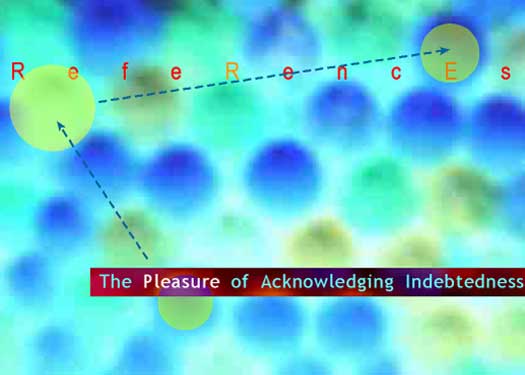
The Pleasure of Acknowledging Indebtedness
“Pleasure” may seem to be a word far removed from the work of tracking and citing sources for your readers. And it is painstaking work to keep accurate notes of where you have found information, examples, and support. It is also true, however, that citing sources is, in many ways, a formal version of something we all do informally–and with a great deal of pleasure–on a regular basis: passing on good tips to people we think will appreciate them.
Let’s look at some examples:
Scenario A: A friend has stopped by and to tell you about a movie he saw this past weekend and how much he liked it. In describing the plot and characters, you realize that it sounds like your friend would also really enjoy a classic movie that is one of your favorites and that you recently saw available at VideoQuest. You recommend this video to your friend, saying, “You really should rent this movie. I think you’d love it!”
Scenario B: Tired of studying, you’ve taken time off over the weekend to bake a batch of chocolate chip cookies, one of your favorites from home. When your roommate returns from a jaunt to the library, she tries one and claims it is the best chocolate chip cookies she’s ever eaten. “Thanks,” you say, “it’s my grandma’s famous recipe. If you’d like it, I can e-mail it to you.”
Scenario C: You are taking a sociology class, your last course to fulfill the GER requirements. Working on your midterm take home exam, you realize that the topic you’ve been assigned fits in perfectly with the reading you did last semester in your criminal justice class. You loved that class, and you’re sure you kept the texts from that class instead of selling them back to the Bookie. Yep. Sure enough. They are on your bookshelf. You liked the book so well that you even remember where in the text the section is that you want to use, so you summarize the key point that seems relevant from this author, include a quotation that makes the point clear, put in a parenthetical citation to the work, and add it to your Works Cited page. You smile, thinking that your sociology professor will be impressed with the original connection you have made and with the reading you’ve done.
What do the three scenarios above have in common? In each, you have some piece of information that you think your audience would be interested in knowing, and you provide a way to share that information and its source with that audience. By doing so, you do two things:
- You let your audience know what sources have influenced you in some way;
- You let your audience know where to go to find out more about this source, thus giving your audience a chance to share your pleasure in the original.
This is the pleasure of acknowledging indebtedness, and we all do it in some form or another all the time.
In the university, we cite sources partly for the pleasure of being able to show our readers, “Hey, I read these things. I’ve used these sources to come to this particular focus or insight on this topic.” It’s a way of getting credit for the work you’ve put in preparing to write your paper, or for the connections you’ve been able to make between the paper topic and other reading or experiences you’ve had. The pleasure of acknowledging indebtedness also comes full-circle when others give proper credit to your unique ideas and contributions.
There is also the pleasure of being able to recommend sources to a reader who wants more information on something you’ve covered. You leave, in essence, a set of “tips” that others can follow. Furthermore, once you see this as a purpose of citing information, you can take advantage of the “tips” other people leave in their Works Cited. For example, if you find an article that is a great fit for your topic, chances are that at least some of the works this author has cited will also be helpful. It’s sort of like reading an interview with a favorite singer or band to find out who they listen to and find interesting; there’s a good chance you’ll like these other singers or bands as well.
Citing sources thus isn’t just about following some academic law. It’s also, ideally, a pleasure of sorts, allowing you to show off a bit the work that you’ve done in the university reading and absorbing others’ ideas while simultaneously pointing the way for others to pursue similar interests.